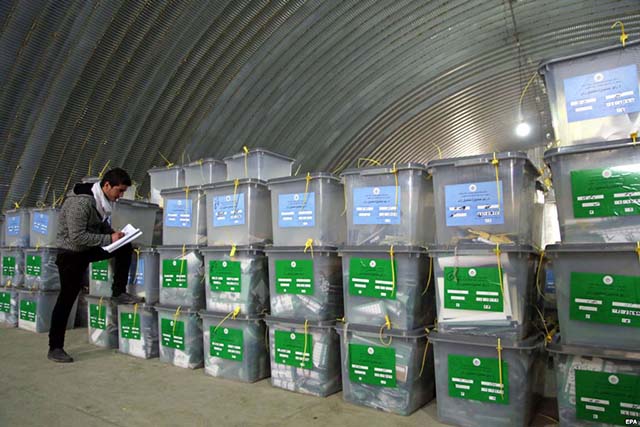The Independent Election Commission (IEC) set October 15, 2016 as the day for the upcoming parliamentary and district council elections. Yosouf Nuristani, the chairman of the Independent Election Commission (IEC), stressed that the commission would go ahead with the preparations for holding the elections and would not allow anyone to interfere. Mr. Nuristani asked government to provide budget to hold parliamentary elections. He expressed that the government and other parties would cooperate with the commission’s preparations for holding the elections and not to interfere in the tasks of the commission. While operation of the commission being questioned, Nuristani stressed commission work according to law. “On the basis of the law, the government does not have the authority to sack us nor anyone is willing to step down for now. The law gives us the right to continue our job in the election commission for six years,” he added.
The IEC has set the date while there are efforts going on by the government to implement the proposed electoral reforms which include amendment of the electoral laws and reestablishment of the bodies governing the elections. On other hand, Chief Executive Officer (CEO), Abdullah Abdullah has said that government is ready to hold parliamentary and district councils’ elections, emphasizing that the electoral reform should be brought before upcoming elections. CEO said the election and announcement of results would be acceptable only if the electoral reforms are implemented and the IEC commissioners are picked by the “Selection Committee”. This is while Nuristani had previously rejected the selection committee as illegal saying that the Committee’s recommendations would have no value to the Commission.
Both President Ashraf Ghani and CEO Abdullah Abdullah have pledged to stand firm in bringing reforms to election system and procedures. After the controversial presidential elections in 2014, the electoral reforms constituted a key part of the agreement that led to the formation of the national unity government and a power-sharing agreement between the two leaders. The reforms process was itself highly controversial, and the leaders of the national unity government bickered over every bit of the issues in the process. Nuristani’s blatant defiance of election reform and government’s role shows how there is still a long path ahead of real reforms to the electoral system, procedures and the governing bodies. Nuristani’s defiance of the process and his insistence for remaining in his position is not the only hamper to the electoral reforms, the government and parliament failure to resolve the current legal stalemate over the amendment of the electoral laws and system is profoundly threatening the reforms process.
The announcement of the date of elections also laid hidden divisions in the national unity government. While the government officially supports the reforms process, insistence of the independent election commission, which is supposed to undergo reforms on opposing the proposed reforms, is ironic. The leaders of the national unity government have never been able to resolve their fundamental differences over key issues. While the two leaders have not openly opposed each other over the issues, they have been always engaged in a game of countering each other’s role and decisions.
The mismanagement of the previous elections led the country into a political crisis that could lead to potential unrest and violence in the country. The IEC’s defiance of the reforms process is in fact defiance of the government’s leadership and the whole political consensus over the national issue.
Based on the recommended electoral reforms, the electoral laws should be amended and the electoral bodies should be reshuffled. This means that both the Independent Election Commission (IEC) and the Election Complaints Commission (ECC) are going to be restructured based on the proposed recommendations of the reforms commission. This is while the IEC and its twin ECC is refusing to recognize the reforms process and acknowledging the reforms. If the government fails to prevent the IEC members from defying the process, it would be clear that the commission is being used as a political ploy as part of the power struggle. The government should ensure that the reforms would be implemented and the two election commissions as well as their members would be included in the reforms.
There is much ahead for the leaders of the national unity government to deliver as agreed two years ago upon formation of the government. The government needs to work hard to implement the electoral reforms process, convene the Loya Jirga and resolve the challenges of distribution of electronic national ID cards. Failing in any of these crucial national matters will be considered failure of the national unity government.
Lagging behind in timely implementation of the electoral reforms will profoundly harm the credibility of the national unity government. The trend of development so far clearly indicates the government’s lack of determination to lead and implement the electoral reforms. The leaders of the unity government need to remain committed to what they promised during their presidential campaigns.

